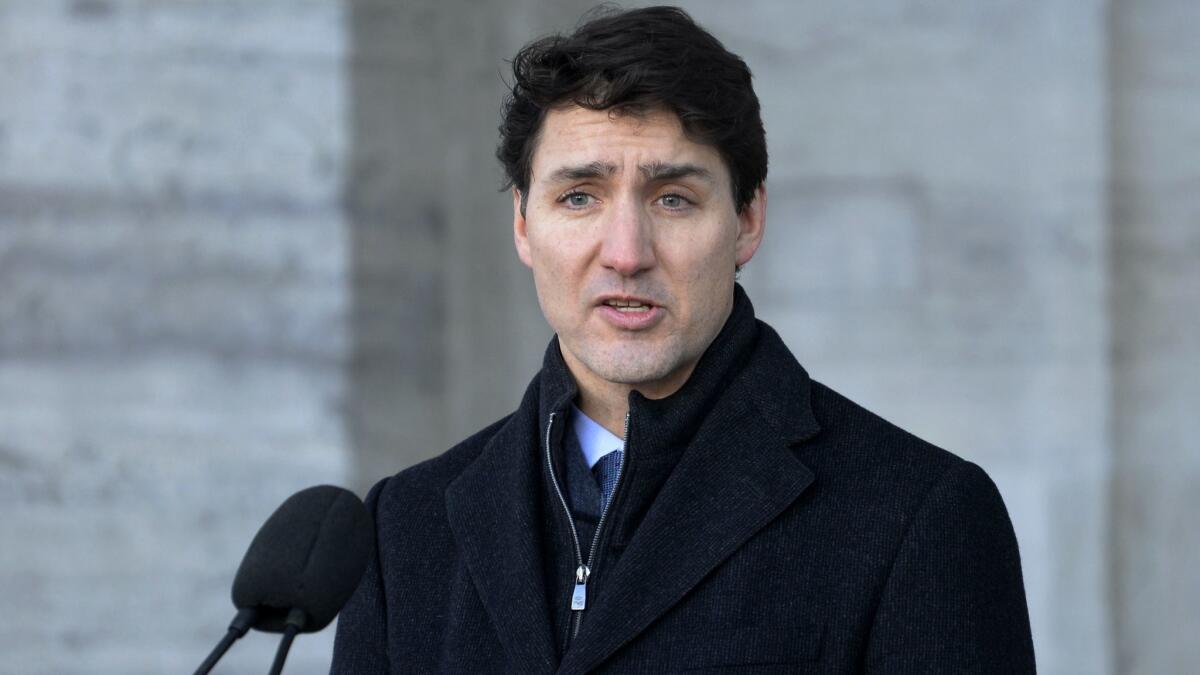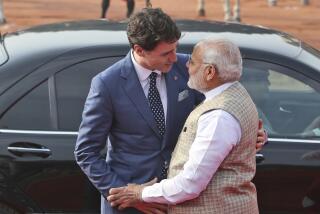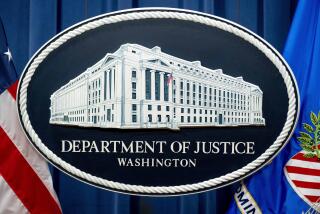Canadian sentenced to death in China, escalating a bitter diplomatic row
A diplomatic dispute between China and Canada is likely to take on new urgency after a provincial court in northeastern China on Monday sentenced a Canadian man to death for drug trafficking — a case for which he previously had been sentenced to life in prison.
China has denied that the case — or the arrests of several other Canadians in recent weeks — have been politicized in retaliation for Canada’s arrest of a senior officer of China’s top telecommunications company, Huawei.
The court handed down the death penalty for Robert Lloyd Schellenberg, 36, after a rushed retrial that lasted just a day. Authorities gave only four days’ notice of the proceedings.
Schellenberg was convicted in November of plotting to smuggle 489 pounds of methamphetamine from China to Australia in 2014. Following the conviction, which came two years after his trial, he was sentenced to life imprisonment and a $22,000 fine.
He appealed — but the Liaoning Provincial Higher People’s Court last month ordered a retrial after prosecutors argued the sentence was too lenient, alleging that Schellenberg was part of an international drug-trafficking conspiracy.
The retrial at the Dalian Intermediate People’s Court came with unusual speed, not long after Canada’s Dec. 1 arrest of a high-profile Chinese businesswoman, Meng Wanzhou, chief financial officer of the telecommunications giant Huawei. Her arrest came at the request of U.S. authorities who want to extradite her on charge of fraud relating to alleged breaches of U.S. sanctions against Iran.
Chinese government officials have been furious about Meng’s arrest, calling it lawless and vicious, and ramping up pressure on Canada to release her or face dire consequences. Beijing officials last month summoned Canada’s ambassador, John McCallum, and U.S. Ambassador Terry Branstad to protest.
But China’s rhetoric has been tougher toward Canada, although Canadian law enforcement officials were responding to the U.S. request. It could be months before Meng’s extradition case is decided, leaving the prospect of a drawn-out, bitter row between Beijing and Ottawa.
In the aftermath of the Meng case, China last month arrested two Canadians, Michael Kovrig, who is both China analyst for the International Crisis Group and a Canadian diplomat taking a leave of absence, and Michael Spavor, who operates a company promoting tours and investment in North Korea. Both were detained at a secret location on suspicion of endangering national security, a serious offense. Another Canadian, teacher Sarah McIver, was arrested last month over a work permit offense, but was released last month and allowed to leave China.
The timing of Schellenberg’s appeal and retrial have raised alarm that he may have been dragged into the worsening diplomatic tensions, a claim that China rejected.
China’s Ministry of Foreign Affairs spokesman Lu Kang denied there was any political dimension to the retrial.
Donald Clarke, an expert on Chinese law at George Washington University, wrote on the legal blog Lawfare that Schellenberg’s case, like those of Kovrig and Spavor, appeared to reinforce the message “that China views the holding of human hostages as an acceptable way to conduct diplomacy.”
He cited “unusual features” of Schellenberg’s case that suggested it might be linked to China’s pressure on Canada over the Meng arrest.
Tension between the two sides has sharpened in recent days. China’s ambassador to Canada, Lu Shaye, last week wrote an opinion piece for the Ottawa-based Hill Times accusing Canada of “Western egotism and white supremacism” in Meng’s arrest and arguing that Canada was applying double standards.
Canada’s Globe and Mail newspaper responded in an editorial Monday that Spavor and Kovrig’s arrests were “obvious retaliation” for Meng’s arrest, adding that they were being denied access to lawyers and held in rooms where the lights were never turned off, “a form of torture.”
Canadian Prime Minister Justin Trudeau accused China of holding two Canadian citizens unfairly, claiming Beijing was failing to respect diplomatic immunity. The diplomatic immunity remark was a reference to Kovrig. China’s Foreign Ministry said Kovrig entered China on an ordinary passport and visa, and was not eligible for diplomatic immunity.

The tensions seem certain to get worse in light of Schellenberg’s death sentence. Canada abolished capital punishment in 1976. On Monday, Trudeau complained that China had “arbitrarily” applied the death penalty to Schellenberg.
Retrials in China are highly unusual, Clarke wrote Friday, adding that “sending the case back for retrial gives China the opportunity to threaten death and to drag out that threat for as long as necessary.”
Several foreign media organizations, including Agence France-Presse and Canada’s Globe and Mail, were invited to observe proceedings, although they watched from a monitoring room in a different location. Clarke said the invitation to foreign media was highly unusual and could indicate that “China wished to show Canada that it is deadly — literally deadly — serious about getting Meng Wanzhou released.”
Clarke said the unusually short time between the court decision to retry the case and the retrial also suggested it was no ordinary case, particularly given the new prosecution allegations that could justify the death penalty.
AFP reported that Schellenberg was brought into court in handcuffs.
Schellenberg said he had come to China as a tourist after traveling through Southeast Asia and ended up being framed by a drug-trafficking gang. He said his difficulties began after a friend recommended a man named Xu Qing as a translator, AFP reported.
“This is a case about Xu Qing. He is an international drug smuggler and a liar,” Schellenberg told the court, according to AFP. The Globe and Mail reported that Xu described himself as a pawn, translating for Schellenberg and caught up in the drug smuggling operation.
The Canadian newspaper cited Schellenberg as saying: “I am not a drug smuggler. I am not a drug user. I am a normal person.” It reported that prosecutors said phone and bank records connected him to a drug smuggling conspiracy.
Xu testified against Schellenberg in court Monday, saying he suspected the Canadian was involved in drug smuggling and reported him to police.
Prosecutors alleged that Schellenberg had purchased tools and tires and gone to a warehouse in Dalian with Xu as part of a plan to conceal drugs inside the tires, according to AFP.
Schellenberg’s lawyer, Zhang Dongshuo, said there was not enough evidence to prove the case against the Canadian.
Twitter: @RobynDixon_LAT
More to Read
Start your day right
Sign up for Essential California for news, features and recommendations from the L.A. Times and beyond in your inbox six days a week.
You may occasionally receive promotional content from the Los Angeles Times.






